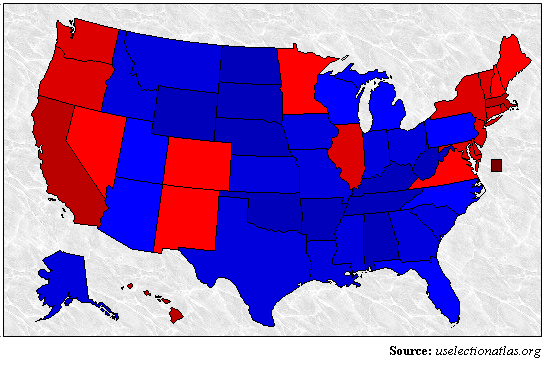By Natalia Castro
As Michigan Democrats continue their battle for a recount, the party has continued searching for opportunity outside the norm to stop Donald Trump from taking office.
The possibility for faithless electors placing their ballots outside of their states’ popular vote seems like a worthy option for Democrats, but it would require delegitimizing our entire voting system. The electoral college was integral to the foundation of the Constitution; we must not forget its significance.
Article II, Section 1 of the Constitution provided clears direction: “Each State shall appoint, in such Manner as the Legislature thereof may direct, a Number of Electors, equal to the whole Number of Senators and Representatives to which the State may be entitled in the Congress: but no Senator or Representative, or Person holding an Office of Trust or Profit under the United States, shall be appointed an Elector.”
Under this law the states are placed in charge of the selection for their electors, once the electors are selected they pledge how they will vote. Most states require that all electoral votes go to the candidate who receives the largest plurality in that state. This practice is called the “winner take all” system and ensures uniformity in voting. However, select states such as Maine allow proportional voting. In a clear majority of states in 2016, electoral voters are bound to voting based on their states decision.
It was this system that allowed the Constitution to be passed. The Great Compromise of the framers created an equal Senate and a population-based House to ensure both small and large states were included in Congress. However, for the presidency another system was needed to ensure unpopulated states did not get overshadowed by highly populated states.
The electoral college serves as a barrier to ensure that no small state is overshadowed by large cities, by utilizing the vote of electors. In this system, all voters matter, whether in large states or small states.
States unhappy with this year’s election results are more than welcome to change, via their state legislatures, how they select their electoral college representatives and how they vote after this year, but unfortunately for them, current laws have been on the books in most states for decades.
The idea that an elector can now change their decision to vote “faithlessly” against what their state has decided is not just against this delicate compromise. In many states it is blatantly illegal, but there are exceptions.
For example, Christopher Suprun was named this year as an electoral college voter in the state of Texas. In a New York Times op-ed, he announced that he will not cast his electoral vote for Donald Trump. While Suprun might have become the Democratic Party’s greatest hope with this news, he is pushing other electors to break faith with the voters of their states. Texas does not have a legal penalty for faithless electors, but 29 states do, with the offense ranging from a misdemeanor to a felony.
Another idea to deny Trump the White House at the electoral college came from the Cato Institute’s Michael Cannon, who writing for the Washington Post, posits, “The only way Democrats stand any chance of persuading Republican electors to abandon Trump is with a dramatic gesture of true bipartisanship. If all 232 Democratic electors pledge to reach across the aisle and vote for a Republican alternative to Trump, it would take just 38 GOP electors to make that person the next president… If Clinton announced she is releasing ‘her’ electors and asked them to vote for a credible Republican alternative, she could plausibly deliver all 232 Democratic electors.”
However, this ignores state laws regarding bound electors who have to vote for the winning party’s nominee, where 151 electors are already required by 15 states’ laws to vote for Trump and 139 electors in 14 states plus the District of Columbia to Clinton no matter what she says, leaving only 248 electors to vote for somebody besides Trump or Clinton as an alternative. Even if Clinton withdrew, it would be up to the Democratic National Committee (DNC) to replace her, not Clinton, according to the party’s bylaws, presumably with another Democrat. The electors in states Clinton won would still be bound to vote for the Democratic nominee.
In other words, for Cannon’s plan to work, even if every unbound elector voted for an alternative candidate, it would still require another 22 electors to break their states’ laws binding them to the winning party’s candidates to get to 270 to elect who they felt was most deserving of the presidency, or for the DNC to select another Democratic nominee acceptable to Republican electors.
Again, such a plan would require a neglect of not only the Constitution, but also the rule of law, exactly what Trump’s supporters elected him to protect, and importantly, what the people just voted to do. Who would follow a president who was elected — by breaking the law at worst or, at best, got there through such a farce? It would be a coup and the winner would lack legitimacy.
This is what gives the electoral college its significance. The winner-take-all system, composed by state laws, has never been truly challenged because it empowers citizens across the country to vote honestly and trust that their electors will do the same, knowing that who wins the electoral college majority, wins the election. When electors act with their own ideology rather than the ideology they have been selected to represent, the entire voting system becomes less legitimate.
The reality is, Trump is not going to lose. Even with 21 states who do not have criminal penalty for voting faithlessly, an alternative candidate to Trump or Clinton would legally only be able to muster 248 electoral votes. Assuming every single elector voted for another candidate, not Clinton or Trump — which would make sense considering Republican party electors will not vote for Clinton and Democratic electors will not vote for Trump — in this case, the split still could only result in a House of Representatives election which as even Cannon notes will surely go to Trump. That is because the House of Representatives, controlled by Republicans, elects the President from the three presidential candidates who received the most electoral votes.
In Suprun’s plan, he encourages fellow electors in to break faith with voters and in Cannon’s plan, he has ignores the math of bound electors in states with laws dictating how the electors must vote. There is no route to 270 in either case.
The encouragement of faithless elector voting is not simply a last-ditch effort to get another President elected, it is a blatant undermining of the successful system our framers adopted and would nullify what remains of states’ rights. Our constitutional system was built on a government by the people and the states, and the electoral college has sanctioned that system, it cannot now be used to take it away because some are unhappy with the election results.
Natalia Castro is a contributing editor at Americans for Limited Government.







